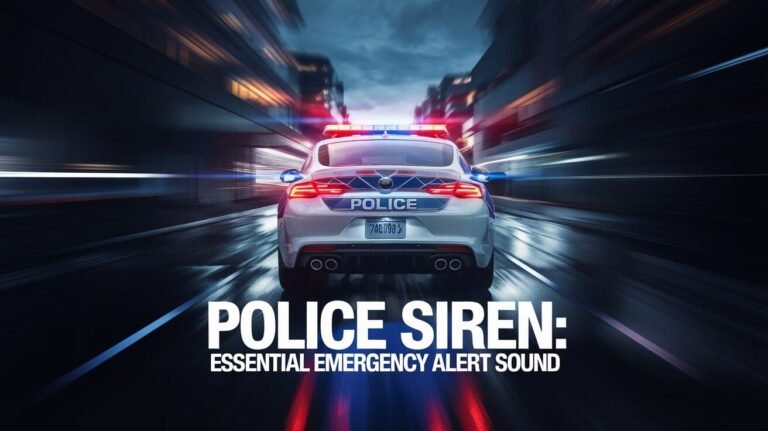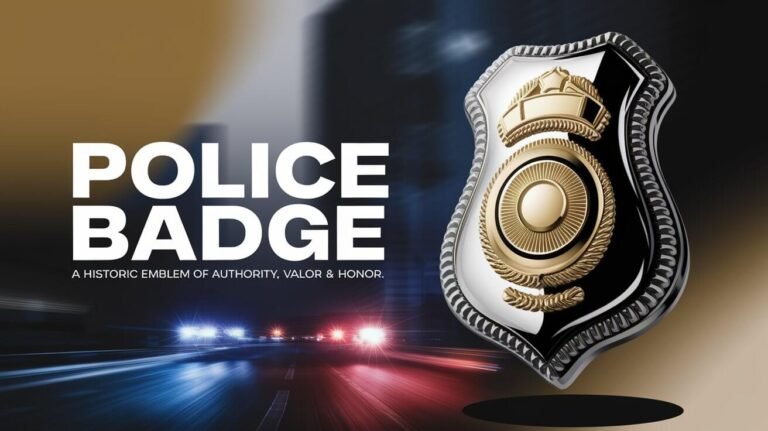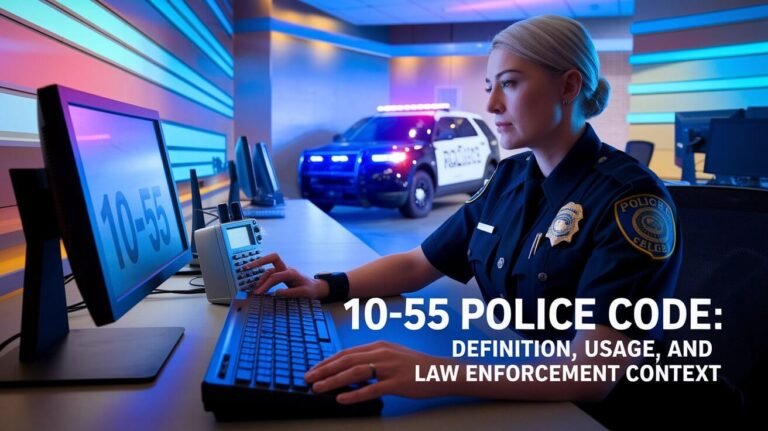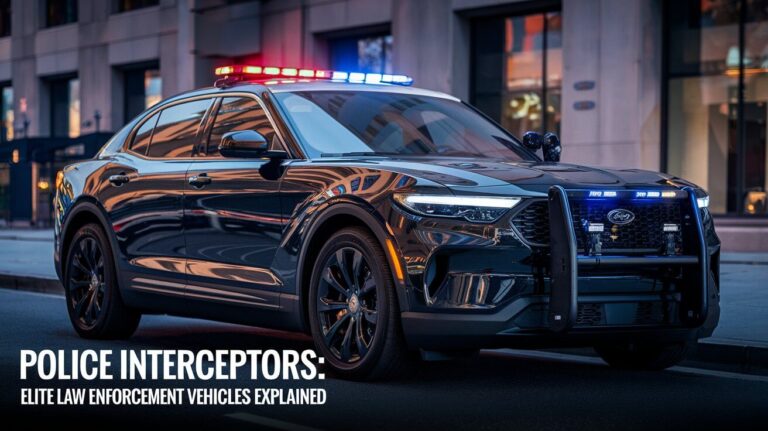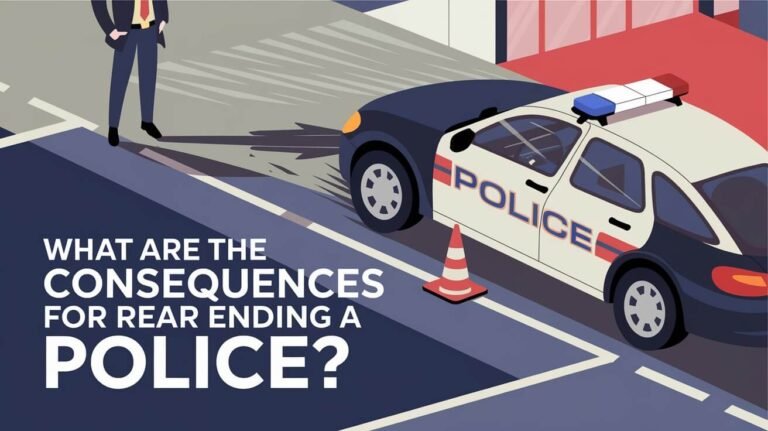Military Police: Enforcing Discipline & Upholding Order
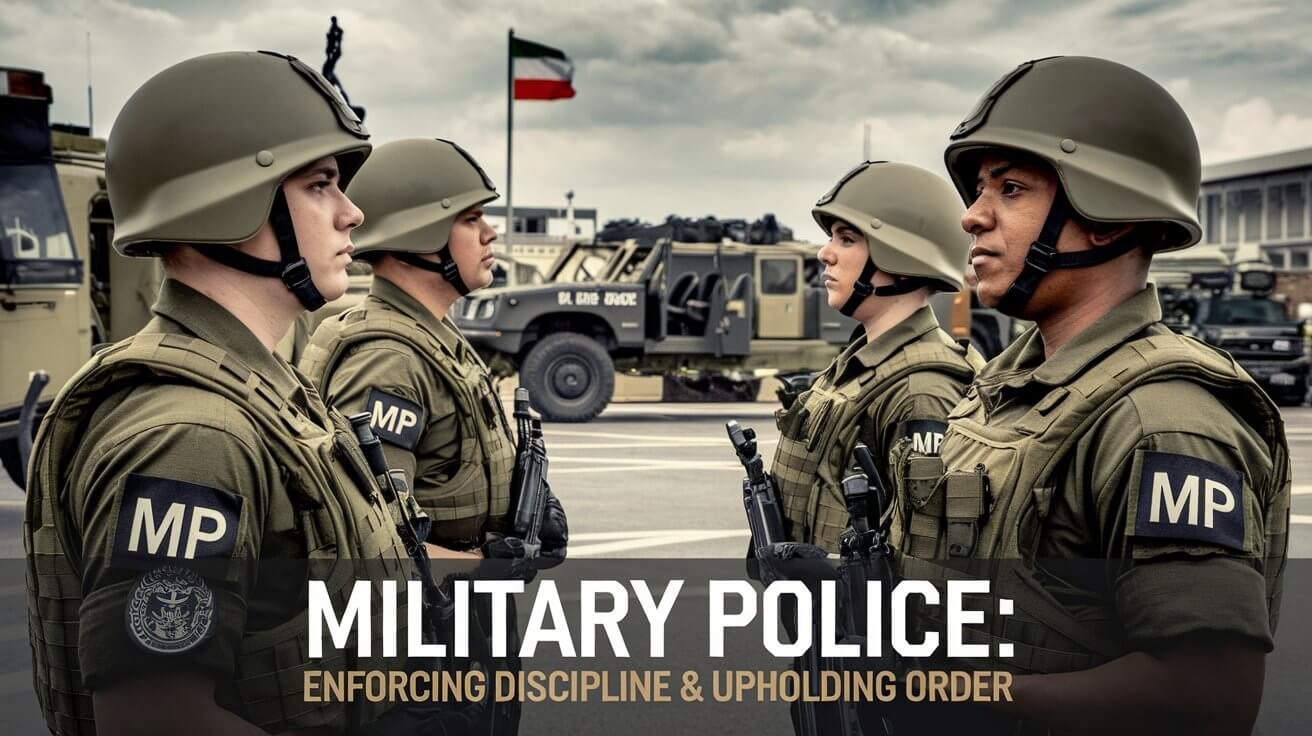
Military police are key in keeping order in the armed forces. They handle many tasks, like protecting forces and securing convoys. They also deal with detainees, which is vital for the military’s success.
In the U.S., military police are found in every branch of the military. They keep military bases and people safe. Their work is critical for the armed forces’ effectiveness.
Military police do more than just enforce laws. They also work in combat zones. They get special training for these roles, learning about crowd control and emergency management.
This training prepares them for many challenges. They protect bases from crime and keep facilities safe. Military police are vital to the armed forces’ success, playing a big role in security and law enforcement.
Military Police Core Mission
The Military Police have a key role in the military. They handle law enforcement, security, and protecting forces. Their main job is to keep order and safety in military areas. They patrol, guard, and enforce rules to keep everyone and things safe.
They are trained for many tasks, from everyday police work to fighting in battles. They manage security operations and plan to protect people and places. They also work to stop and handle threats to military folks and stuff.
Law Enforcement on Military Installations
Law enforcement is a big part of what Military Police do. They follow the Uniform Code of Military Justice and other rules. They look into crimes, arrest people, and patrol to stop and find crimes.
Security Operations Management
Managing security is also a big job for Military Police. They plan and carry out security steps to protect people and places. They watch over important people, keep safe equipment, and guard sensitive spots.
Force Protection Duties
Protecting forces is a key part of Military Police work. They keep people and things safe on and off bases. They do patrols, guard convoys, and handle emergencies and threats.
Daily Responsibilities on Base
Military Police are key to keeping order on base. They enforce rules and provide law enforcement. Their tasks include leading teams, keeping equipment in good shape, and making sure everyone is healthy and happy.
For example, a Squad Leader must take care of expensive gear. They also plan training for their team. Over 170 Soldiers in Military Police Company get their training scheduled by Operations NCO.
They also look after vehicles and equipment worth over $1,000,000. Military Police on base have many important jobs. These include:
- Maintaining base security and enforcing military protocol
- Providing law enforcement services and support
- Supervising and managing teams, including training and equipment management
- Ensuring the health, morale, and welfare of their squad
Military Police have a big job on base. They keep things safe and in order. Their work is essential for the military’s success and the safety of everyone and everything on base.
Military Police are responsible for maintaining law and order on base, and their daily responsibilities reflect the importance of this role. From supervising teams to maintaining equipment, their duties are critical to the success of the military’s mission.
Combat Zone Operations
Military Police are key in combat zones. They handle battlefield circulation, enemy prisoner management, and area security. Their work requires special training and gear.
In combat zones, Military Police manage troop, equipment, and supply flow. This is vital for smooth battlefield movement. They also handle enemy prisoners, from detention to securing them.
Battlefield Circulation Control Measures
Key steps Military Police take for battlefield control include:
- Setting up checkpoints and roadblocks
- Patrolling to keep areas secure
- Working with other units for traffic management
Enemy Prisoner Management Procedures
For enemy prisoners, Military Police follow these steps:
- Detaining and processing prisoners
- Conducting interrogations for intel
- Securing and moving prisoners to facilities
In combat zones, Military Police must be ready to adjust and face new threats. Their skills and training are vital for keeping order and success in military missions.
Physical Fitness Standards
Physical fitness is key in military training and law enforcement. Military Police officers must pass tough training programs. The Army Combat Fitness Test (ACFT) is a big part of this, with six events to test strength, mental toughness, and more.
The ACFT includes the Maximum Deadlift, Standing Power Throw, and Hand-Release Push-Up. It also has the Sprint-Drag-Carry, Plank, and Two-Mile Run. Each event needs a score of at least 60 points, with a total of 360 points needed across all six. The highest score for each event is 100 points, making the total maximum score 600.
| Event | Minimum Score | Maximum Score |
|---|---|---|
| Maximum Deadlift | 60 | 100 |
| Standing Power Throw | 60 | 100 |
| Hand-Release Push-Up | 60 | 100 |
| Sprint-Drag-Carry | 60 | 100 |
| Plank | 60 | 100 |
| Two-Mile Run | 60 | 100 |
Military Police officers also need to pass a physical fitness test for law enforcement. This test checks if they can do tasks that need strength, endurance, and agility. Meeting these standards helps them get ready for military training and law enforcement work.
Training Pipeline and Certification
Military Police go through tough training to prepare them for different situations. Their training includes basic combat, advanced individual training, and specialized courses. These steps help them gain the skills and knowledge needed for their jobs.
The certification process for Military Police ensures they meet high standards. The training pipeline is key to this, giving them a solid base for success. By finishing the training and getting certified, Military Police show their dedication and skill.
Basic Training Requirements
Basic combat training is a must for Military Police. It teaches them the basics like combat, first aid, and how to communicate. They must pass physical and mental tests and learn about military law and ethics.
Advanced Training and Certification
After basic training, Military Police can take advanced courses. These teach them specialized skills in law enforcement, security, and intelligence. To get certified, they must pass exams, undergo a background check, and have their training reviewed.
Important parts of Military Police training and certification include:
- Completing basic and advanced training
- Getting specialized qualifications in law enforcement and security
- Certification from the Department of Defense Peace Officer Standards and Training Commission
- Working in local communities through reciprocity agreements with 19 states
Equipment and Tools
Military Police use a lot of gear to do their jobs well. They carry more than just a gun, handcuffs, and a nightstick now. Their tools have grown a lot from the 1950s.
They carry automatic pistols, extra ammo, handcuffs, radios, and pepper spray. Their cars have first-aid kits, medical tools, and breath analyzers too. These help them check if drivers are drunk.
They wear bulletproof vests, often made of Kevlar, to stop bullets and knives. Bomb units have even stronger vests. They also use batons, stun guns, and tear gas to keep everyone safe.
Here are some key things Military Police use:
- Automatic pistols and spare ammunition clips
- Handcuffs and portable radios
- Pepper spray and nonlethal weapons
- Bulletproof vests and robust vests for bomb disposal units
- First-aid kits and specialized medical equipment
Military Police also have military gear like tanks and artillery. The U.S. Army has many tanks and artillery units. This gear helps them keep order in tough situations.
Military Police Authority Scope
The role of Military Police is key, as it outlines their duties and where they can act. They work within specific guidelines and team up with civilian groups. Their main job is to offer top-notch policing and security, helping the military stay ready and effective.
Military Police can enforce laws on military bases and properties. They can arrest and charge people who break the law there, including civilians. But, their power is mostly limited to military areas. They don’t have the same authority as regular police in other places.
Jurisdiction Guidelines
The rules for Military Police vary by country and military branch. For instance, in Canada, the Canadian Forces Military Police can act like regular police. In Colombia, Military Police handle military spots and some public places like airports and museums.
Collaboration with Civilian Agencies
Military Police often team up with local police to help out. They work together on investigations, patrols, and training. This teamwork boosts safety and security, both on and off military bases.
Some main parts of Military Police’s role include:
- Enforcing laws on military bases and properties
- Working with civilian agencies for support
- Offering professional policing and security to help the military
Military Police’s authority is vital for keeping order on military bases. Knowing their rules and teamwork with civilian groups shows how important their work is for national security and public safety.
Career Advancement Paths
Military Police officers have many ways to move up in their careers. They can get promoted and take specialized training. This career path can lead to jobs in policing, investigations, and more in the military.
To get ahead, Military Police officers can join competitive boards and take civilian courses. The Army Correspondence Course Program (ACCP) and Defense Activity for Non-Traditional Education Support (DANTES) help improve skills.
Here are some ways to advance: * Use the Army Career Tracker (ACT) to track your career. * Make individual development plans (IDPs) to match your goals with Army needs. * Use educational resources like the College Level Exam Program (CLEP) and DANTES. * Get technical certifications to earn promotion points.
Using these opportunities, Military Police officers can grow in their careers. This can lead to success in law enforcement.
| Military Occupational Specialty (MOS) | Description |
|---|---|
| 31B – Military Police | Perform law enforcement and security duties |
| 31D – USACIDC Special Agent | Conduct investigations and gather intelligence |
| 31E – Corrections and Detention Specialist | Oversee corrections and detention operations |
| 31K – Military Working Dog Handler | Handle and care for military working dogs |
| 31Z – Senior Military Police Sergeant | Supervise and lead Military Police units |
Specialized Units and Teams
Military Police have many specialized units and teams. They are key to keeping law and order. These units face high-risk situations and help other law enforcement agencies.
For example, K-9 units have dogs trained to find narcotics, explosives, and more. These dogs are a big help in keeping everyone safe.
Special reaction teams quickly respond to dangers like hostage situations and terrorist attacks. They are well-trained and have the latest gear. Military Police also have units that protect important people.
Types of Specialized Units
- K-9 units: handle tasks such as narcotics detection and patrol duties
- Special reaction teams: provide a rapid response to high-risk situations
- Protective services: provide security for high-ranking officials and other important personnel
There are more teams like crime scene investigation and traffic enforcement units. They all work together to keep everyone safe. Using these units is a big part of the Military Police’s crime-fighting strategy.
| Unit Type | Description |
|---|---|
| K-9 units | Handle tasks such as narcotics detection and patrol duties |
| Special reaction teams | Provide a rapid response to high-risk situations |
| Protective services | Provide security for high-ranking officials and other important personnel |
Deployment Cycle and Rotation
Military Police go through a deployment cycle and rotation. This includes training and getting ready for deployment. The cycle has four phases: Pre-deployment, Deployment, Post-deployment, and Reintegration.
In the pre-deployment phase, soldiers do normal training and medical checks. This keeps them and their units ready.
The Army wants a 1-to-2 ratio for active component deployments. This means one year deployed for every two at home. For the Reserve and Guard, it’s a 1-to-4 ratio. The ARFORGEN cycle helps with deployment predictability. It was made to meet the growing need for troops, starting in 2003.
Some important stats about military deployment are:
- Over 140,000 troops have received pre-deployment training at Fort Dix, N.J.
- Demand for forces has exceeded deployment requirements by eight to ten times compared to historical demands during missions in Bosnia and Kosovo.
- 4,000 Pennsylvania Army National Guardsmen from the 56th Stryker Brigade were deployed for a year-long mission in Iraq.
Military Police are key in the deployment cycle and rotation. Their training and preparation are vital for a successful deployment. Understanding these concepts is important for Military Police and all servicemembers.
Civilian Transition Opportunities
Military Police have many options when they leave the military. They can work in law enforcement, federal agencies, or private security. The transition can be tough, but with the right help, they can find new careers.
Popular choices include becoming police officers or detectives. They can also work for federal agencies like the DEA or Border Patrol. These jobs pay well, with salaries ranging from $29,021 to $86,338.
Law Enforcement Careers
Law enforcement is a great fit for Military Police. They use similar skills and training. Here are some examples:
- Police Officer: $38,187 average salary
- Corrections Officer: $38,187 average salary
- DEA Agent: $67,407 average salary
Federal Agency Positions
Federal jobs, like DEA or Border Patrol, offer good pay and benefits. They need special training and education. But, they’re rewarding for those who love law enforcement.
| Career | Average Salary | Age Requirement |
|---|---|---|
| DEA Agent | $67,407 | 21-37 years |
| Border Patrol Agent | $86,338 | under 40 years |
Military Police can use programs like the Army Career Skills Program. This helps them get trained and experienced in their new field. It makes the transition smoother and more successful.
Last Thoughts
The role of military police is key in keeping the armed forces in order. They handle many tasks, like enforcing rules on bases and keeping people safe in combat. Their hard work and dedication to keeping the military safe is truly commendable.
We’ve looked at what military police do every day and how they train. We’ve seen how important they are in combat and how they stay fit. We’ve also talked about how they can move up in their careers and the different teams they work in.
Military police are heroes who keep the armed forces safe and secure. They work hard on bases and in combat zones. Their dedication shows how important they are to the military’s success.

